This past Sunday, Season 3 of Outlander concluded on Starz, while Season 8 of The Walking Dead reached its midseason break on AMC.
At the moment, I can’t think of a bigger disparity between two popular TV dramas right now than the differences between Starz’s Outlander and AMC’s The Walking Dead. The two are almost diametrically opposed in terms of theme, tone, cultural impact, and ratings.
In fact, their yin and yang are a perfect metaphor for the two realities that we seemed to be caught between in 2017: love vs. hate, feminism vs. toxic masculinity, and hope vs. despair.
Let’s take a closer look at the how each show’s recent storylines have led to wildly different payoffs — and what the arc of their ratings implies about their changing futures.
*** WARNING: Spoilers ahead for Outlander Season 3 and The Walking Dead Season 8 ***
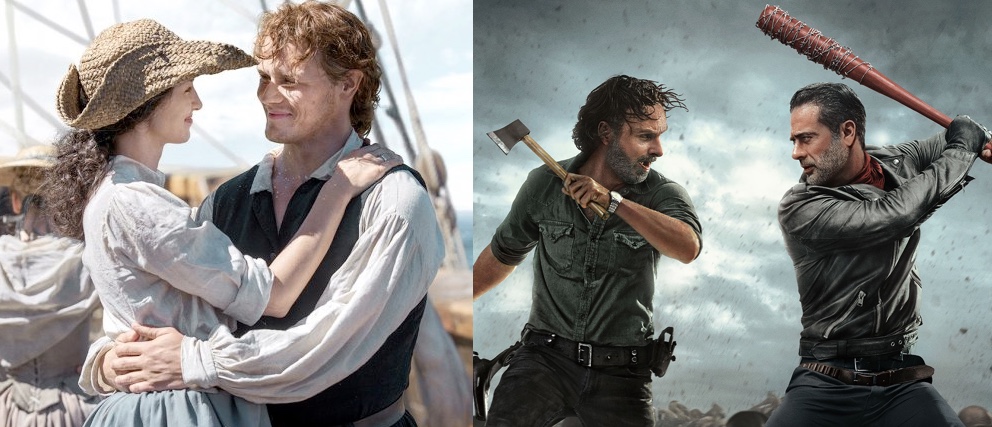
With or without youuuuuuu
A Tale of Two Themes
Honestly, Charles Dickens could have been writing about Outlander vs. The Walking Dead 160 years ago:
It was the best of times, it was the worst of times
It was the age of wisdom, it was the age of foolishness
It was the epoch of belief, it was the epoch of incredulity
It was the season of Light, it was the season of Darkness
It was the spring of hope, it was the winter of despair
We had everything before us, we had nothing before us
We were all going direct to Heaven, we were all going direct the other way
— “A Tale of Two Cities” (1859)
At its heart, Outlander is a story about the power of love, while The Walking Dead is a story about the futility of the social contract.
As such, Outlander‘s lowest points exist to magnify the upside of its high points. The show revolves around Claire and Jamie’s struggle to remain together despite the many plot contrivances working to tear them apart. The more fraught their separation is, the more satisfying their next reunion will be.
Meanwhile,The Walking Dead‘s high points only exist to get ripped to shreds. Its entire thesis is that everyone is doomed regardless of their actions, and it treats kindness as a death sentence. If a character on TWD expresses anything even remotely resembling hope, optimism, or affection for their fellow human, you can bet that character will die a morbid, grisly, soul-crushing death faster than you can say “Dale, stay away from that cow.”
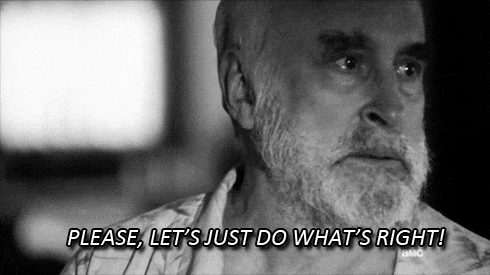
Outlander‘s audience is rewarded for believing in bravery, loyalty, and basic human decency, while The Walking Dead‘s viewers are punished for wanting the same.
Thus, if Outlander is the New Testament, The Walking Dead is The Book of Job without end.
Protagonists vs. Agony-ists
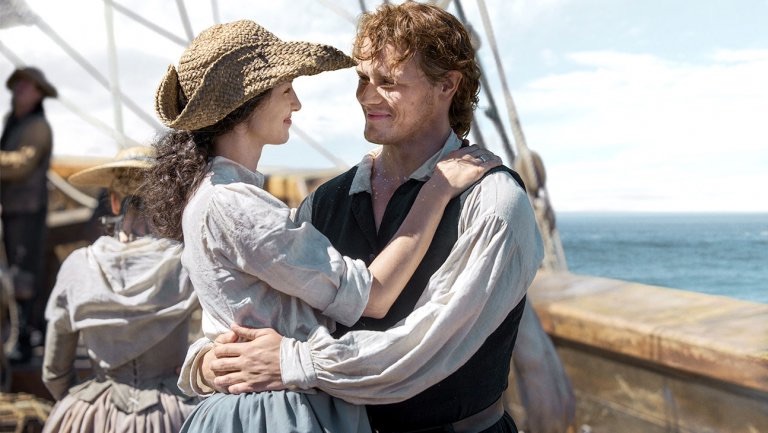
Saaaaaaailing takes me awaaaaay to where I’ve always heard it could be
Outlander is built around two strong feminist protagonists.
Claire (Caitriona Balfe) is a strong-willed, time-traveling doctor, wife, and mother who must navigate the social norms, politics, and life-or-death conflicts that span multiple continents and time periods.
Jamie (Sam Heughan) is an alpha male renegade war hero as depicted through the female gaze of author Diana Gabaldon, who balances his macho instincts with honor, grace, and an increasingly open mind.
Their supporting cast may be petty or myopic in their initial desires, but over time they often learn to adapt, evolve, and grow.
As such, Outlander‘s plots revolve around characters taking actions that stretch their comfort zones, all in pursuit of shared successes (which are the secret ingredient to every crowd-pleasing blockbuster).
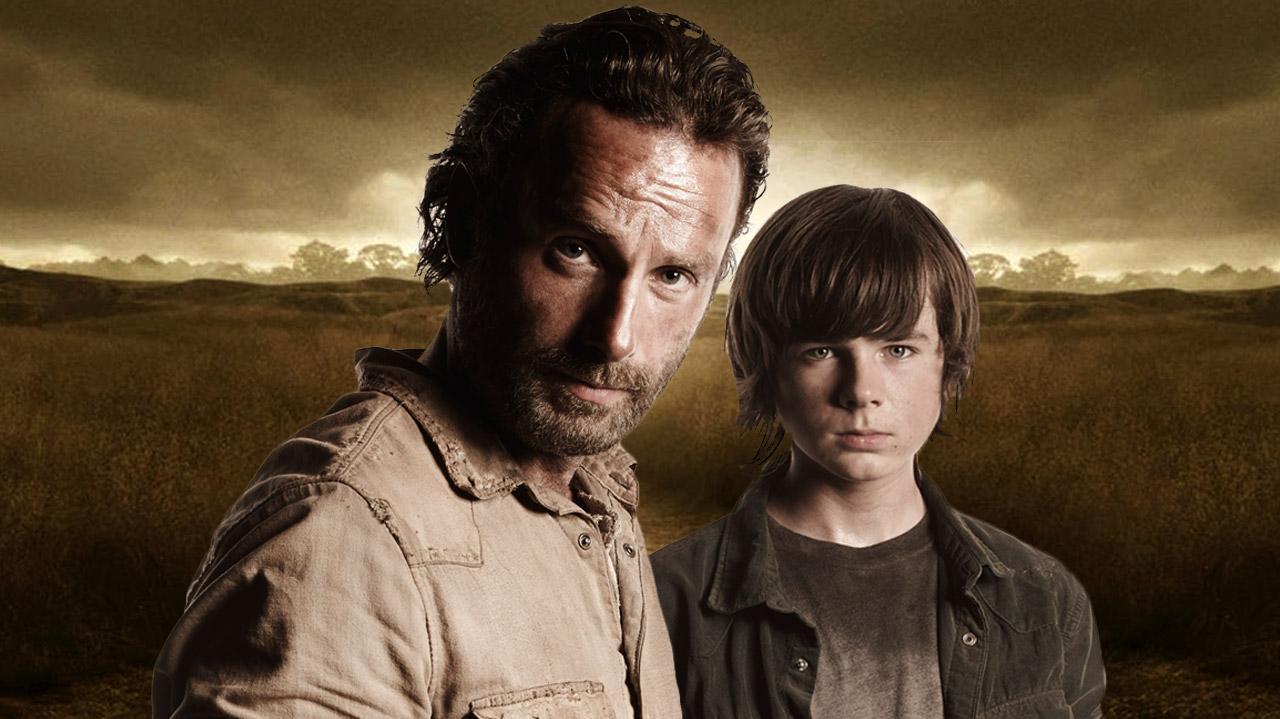
Little boy blue and the man in the moon
Meanwhile, The Walking Dead is built around Rick Grimes (Andrew Lincoln) and the various family and friends he loses during his endless downward spiral in a post-zombiepocalypse where society has fallen and the only thing keeping everyone from murdering everyone else is… uh… nothing really; everyone basically just keeps murdering everyone else in a neverending battle of Who’s a Less Terrible Human at This Particular Moment?
I’ve written before about the similarities between The Walking Dead and Game of Thrones, but GOT’s characters have a much wider array of motivations, actions, and desires than TWD does. That’s because while GOT explores the duality between good and evil that most characters wrestle with, The Walking Dead is mostly interested in where each character falls on an increasingly tilted scale of nihilism.
Because of this, TWD’s characters aren’t really characters; they’re one-dimensional points between humanity and depravity. As such, the show’s plotlines are mostly concerned with putting characters in lose-lose situations and seeing which bad choice they’ll make.
And boy, was Season 8 an exercise in seeing just how much the characters — and the audience — could take.
Plot Speeds, Fast and Slow
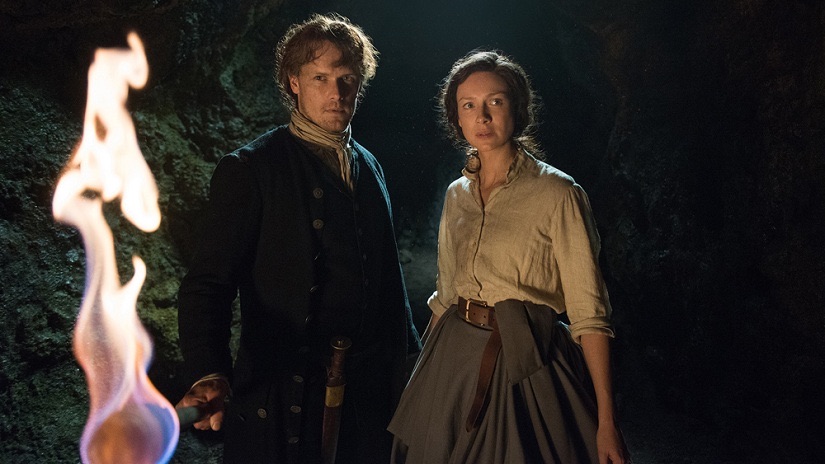
Aruba, Jamaica, oooo I wanna take you to Bermuda, Bahama…
Brace yourself, because things are about to get brisk.
In Season 3 of Outlander, Claire — who left Jamie during the Jacobite uprising of the 1700s to raise their daughter in the relative safety of the 1940s — learns that Jamie may not have died during the ill-fated Battle of Culloden, so she travels back through time to reunite with Jamie 20 years after their last separation. She finds that former Scottish rebel Jamie has since become an enemy of the crown in his new role as a smuggler and a printer of seditious pamphlets meant to incite a new uprising against the British monarchy.
They spend the latter half of the season searching the Atlantic for Jamie’s nephew, Young Ian, who was captured by a Portuguese slave ship and sold to a witch while trying to retrieve precious gems that would have been used to negotiate a divorce settlement with the woman Jamie married out of propriety after they all thought Claire had departed the 1700s forever. (And if that doesn’t sum up Outlander‘s Harlequin romance meets time-traveling soap opera vibe, nothing will.)
The show’s cliffhangers move fast — maybe too fast, given how much narrative ground they have to cover — with Claire being separated from Jamie (again!) during a typhoid outbreak on a second ship, Jamie being hunted for murder, Claire nearly dying in the island jungles before being rescued by a rogue priest and his mother-in-law (it’s a long story), and Claire and Jamie being reunited just in time to save Young Ian from their fellow time-traveling frenemy, Geillis (the “witch”), who intends to travel back to the future and murder their daughter to fulfill a prophecy that will put a Scottish king on the throne.
Whew. Hang on a second. Let me catch my breath because that was all one sentence.
Okay, now for a slow jam.
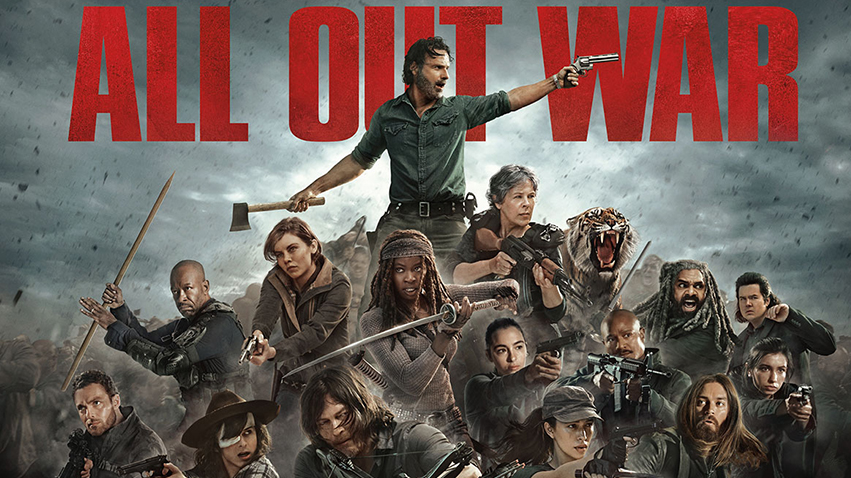
WAR! Huh. Good God, y’all. What is it good for? Absolutely nothing. Say it again!
Recent TWD seasons have revolved around the pending war between Rick and Negan (Jeffrey Dean Morgan), the alpha male whose faction of survivors (the Saviors) are the antithesis of Rick’s survivors (the Alexandria-Hilltop-Kingdom alliance), because… uh… well, actually, they’re really not all that different.
On the surface, Rick is obviously supposed to be the good guy and Negan — who murders his enemies with a barbed wire baseball bat he calls Lucille — is clearly the villain.
The problem is, TWD’s whole schtick is asking “how far are you willing to go to protect the people you love?” And that’s where the comparison between both men turns out to be a matter of degrees.
Sure, Negan is a hard-ass with a penchant for cringe-inducing “macho” dialogue and bloody executions, and he may rule his tribe with an iron fist… but he also keeps his people alive and safe from the walkers.
Rick, on the other hand, is motivated by vengeance and a desire to enact justice. This almost always results in him underestimating his enemies, overplaying his hand, and presuming that everyone else who follows him believes in his plans as much as he does despite his plans usually getting them killed. (Inexplicably, his followers still generally stick with him because… I mean, is any other option notably better?)
In Season 8, Rick enacts what should be his ultimate revenge on Negan by hatching a complex plot to trap the Saviors in their compound and then annihilate them… or at least Negan… but probably all of them.
Needless to say, this goes terribly wrong.
Payoffs vs. Debts
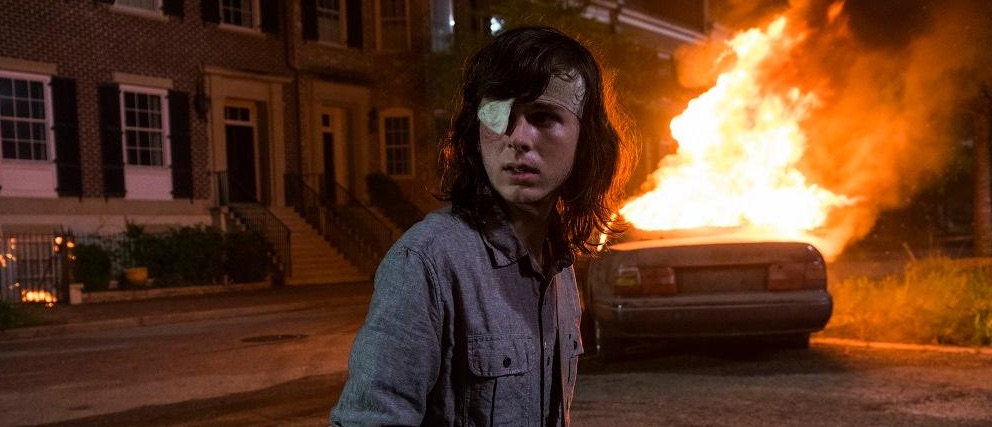
Some like it hot and some sweat when the heat is on
The cliffhanger ending of each show’s story arc perfectly encapsulates what these shows do best… or, at least, what they do most.
In The Walking Dead, Rick’s war on the Saviors fails mostly due to Rick himself, who frequently does scream-at-your-TV-worthy stupid shit like abandoning his tribe by himself on their eve of their victory, just so he can attempt to form an alliance with an outgroup that already tried to kill him once, and winds up nearly getting himself killed again because he can’t resist trying to intimidate groups of people who outnumber and outgun him.
So, after spending 7 episodes building up to Rick’s alleged victory over Negan, it all comes crashing down because no one on this show is ever allowed to be happy.
Instead, Rick’s own team disobeys his orders, the Saviors find a way out of Rick’s deathtrap, Rick himself arrives too late to be useful in his own endgame, and Negan winds up firebombing Alexandria to smithereens while driving the survivors into the sewers. Michonne is a catatonic wreck, Maggie rejects her guiding principles, and Ezekiel loses his entire tribe.
To top it all off, the midseason ends with one of the most shocking (and fan-upsetting) twists in Walking Dead history: it seems that Rick’s son Carl, his only living (blood) relative and the child he’s spent the past eight seasons doing everything in his power to protect, got bitten by a walker on a recent outing and is laying in the sewers, about to die.
To make matters worse — and to underscore the unrelenting misery at the heart of The Walking Dead — Carl’s bite happened while he was disobeying Rick by being kind to a fellow survivor and trying to help him. So, in true TWD fashion, someone does something humane and winds up paying the ultimate price as the result of a completely avoidable mishap.
By comparison, if TWD’s midseason ends with victory crumbling into defeat, Outlander‘s season ends on the exact opposite note.
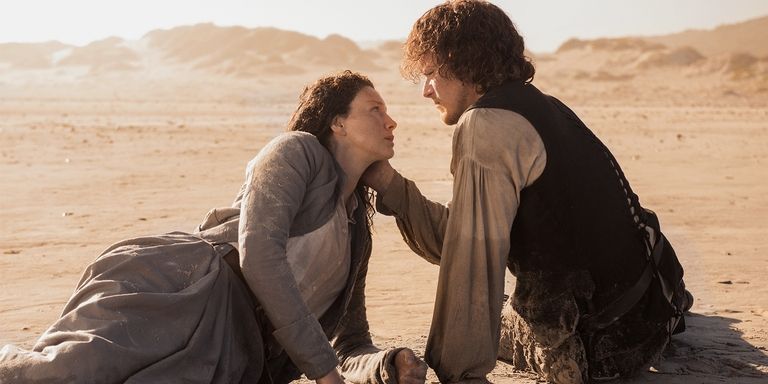
A whole new world… a new fantastic point of view
After rescuing Young Ian from Geillis, the Claire-and-Jamie entourage sails for home… but they’re shipwrecked by a massive storm and Claire nearly drowns before Jamie saves her, and they wash up on the shores of… Georgia? Yup: they arrive in the American colonies, where they can start new lives and Jamie will (presumably) no longer be hunted by British authorities.
So while the leads on Outlander repeatedly defy death, exhibit valor, and are rewarded with a chance at a fulfilling new life together… the leads on The Walking Dead repeatedly fall prey to fear and loathing, exhibit moral confusion, and are punished for their attempt at delivering justice by having to literally flee underground into the sewers, and/or die.
In other words, Outlander is 2017 Instagram and The Walking Dead is 2017 Twitter.
Dueling Ratings Arcs
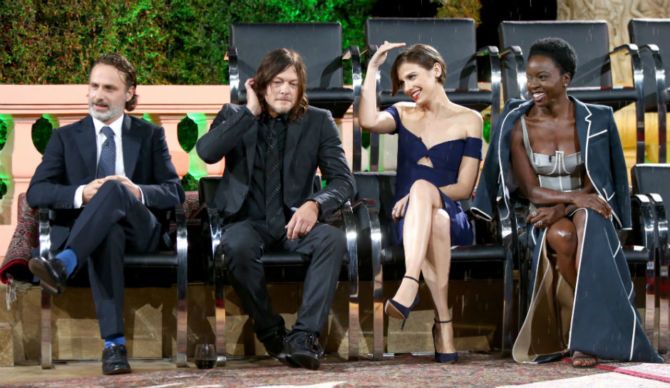
No, really, tell us again how bad we’re doing while we count up allllllll this money.
Let’s not obscure the facts: The Walking Dead is still one of the most-watched shows on television.
In fact, it routinely outperforms most network TV shows, despite airing on a cable channel. Even on a bad day, it pulls in 6 times as many viewers as Outlander does.
But the real news here is in the ratings trends.
The Walking Dead‘s high-water mark, viewership-wise, happened three years ago. In Season 5, TWD regularly averaged around 14 million (14M) viewers per episode.
The next year, TWD Season 6 was down slightly, averaging 12M viewers per episode. But ever since the fan-infuriating “who did Negan just kill?” cliffhanger at the end of Season 6, The Walking Dead has been in ratings jail.
As this chart from The Ringer depicts, The Walking Dead’s ratings are in freefall.
Yes, fans tuned in to find out who Negan killed in the Season 7 premiere (which earned 17M viewers), but after that they tuned out in droves. Only two other episodes that season topped 12M viewers. For a show that once averaged 14M, that’s a huge drop.
It gets worse.
So far in Season 8, no episodes have topped 12M viewers.
Only the season premiere hit double-digits; the other episodes have only attracted 7-8M viewers each.
Keep in mind, TWD hadn’t seen a sub-10M episode in nearly five years, since all the way back in Season 3 (November of 2012)… but now their last seven episodes have all come in below 9M.
On the other hand, Outlander would love to have TWD’s ratings “problems.”
That’s because Outlander has never even attracted 2M viewers for a single episode.
And yet…
While Outlander showrunner Ronald D. Moore would surely love to have the “disappointment” of a season that averages 7M viewers per week, this isn’t an apples-to-apples comparison.
For one thing, AMC reaches over 90M U.S. households, while Starz reaches 24M. That’s a vastly different amount of prime-time penetration and pop culture impact.
But here’s the other big difference between the two shows: Outlander‘s ratings are inching up.
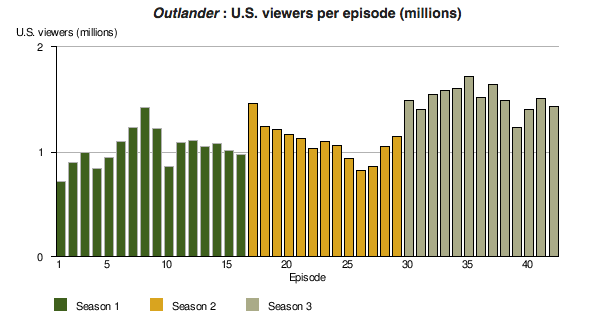
Prior to Season 3, Outlander‘s most-watched episode was its Season 2 premiere, at 1.46M. This season, nine of the thirteen episodes topped the 1.46M mark. And with another year for new fans to find the show via streaming reruns, I wouldn’t be surprised if this season’s high mark of 1.72M becomes Season 4’s new average… or above.
SIDE NOTE: Online audiences are a whole different puzzle, with 75% of Starz’s online subscribers arriving through Amazon, who also makes AMC’s The Walking Dead available to Amazon Prime members. Now that TWD creator Robert Kirkman is leaving AMC for his new content deal with Amazon, TWD’s numbers could continue to slip.
Conclusion?
Both Outlander and The Walking Dead are likely to survive for several more seasons. Each is a signature hit for its network, and both shows still have a wealth of source material left to work through. As long as fans keep tuning in, AMC and Starz will be more than happy to keep each series running, because they need reliable anchors while they test out new shows.
But as the long arc of The Walking Dead — and the equally exhausting arc of 2017 itself — has shown, there’s a limit to the amount of nihilism we’ll subject ourselves to before we start to seek out proof that all of our suffering will be worth it.
And in that sense, Outlander may be best-positioned to capitalize on the kind of roll-up-your-sleeves, hardworking optimism that could swing 2018 back toward the bright side.
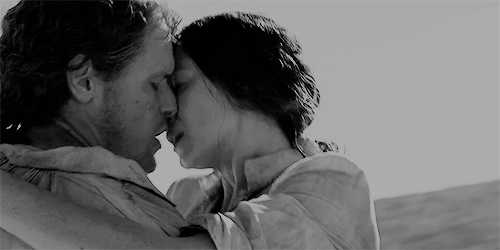
We both are so excited ’cause we’re reunited, hey, hey
If You Liked This Post
… then you may also enjoy my take on where Marvel’s Defenders went wrong, or why Stranger Things 2 has a nearly-perfect first episode.
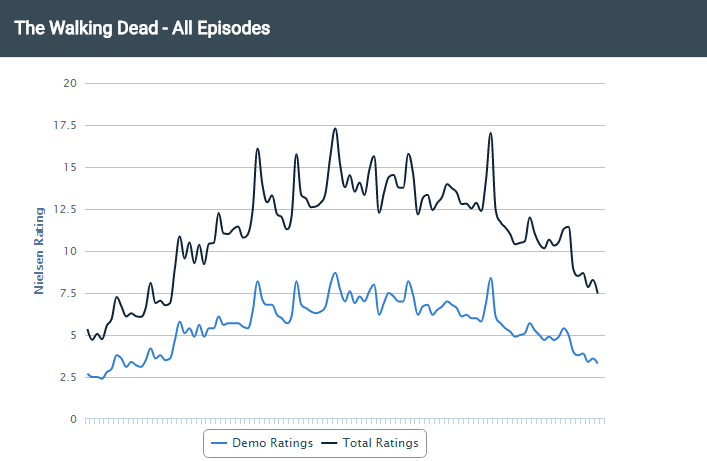


0 Comments